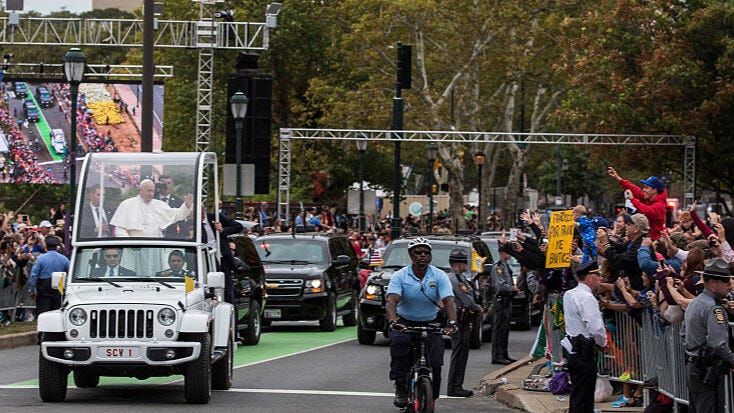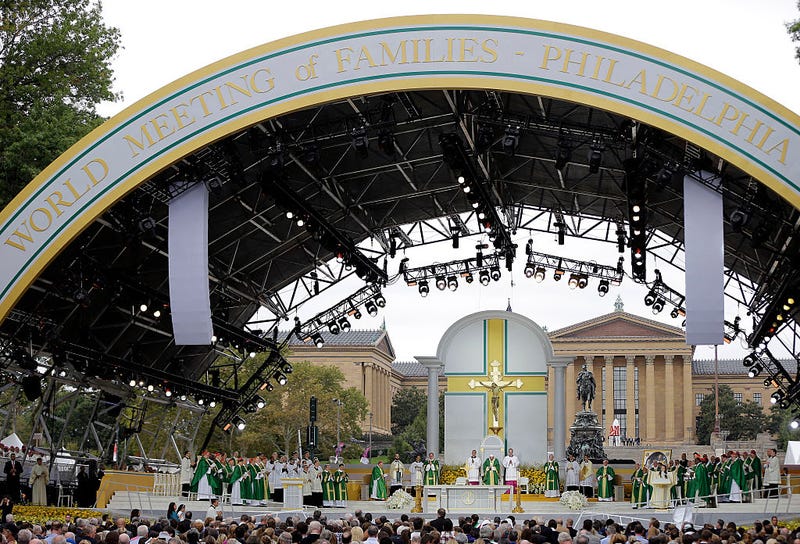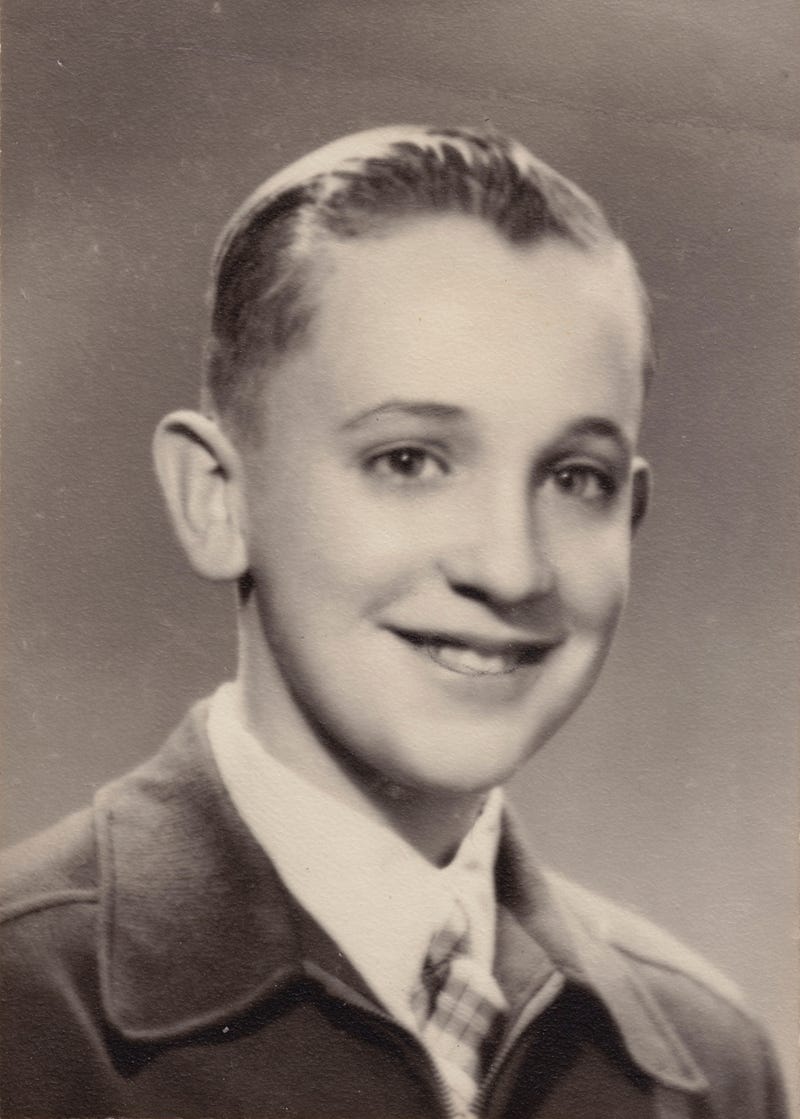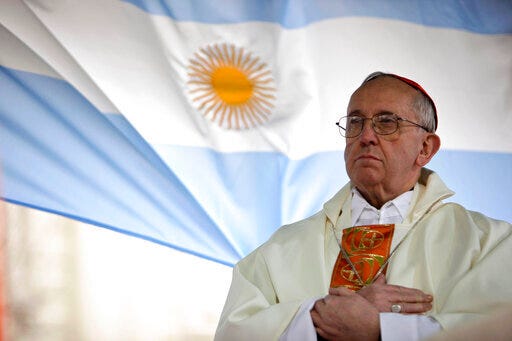
PHILADELPHIA (KYW Newsradio) — Pope Francis, history’s first Latin American pontiff who charmed the world with his humble style and concern for the poor but alienated conservatives with critiques of capitalism and climate change, died Monday. He was 88.
Francis, who suffered from chronic lung disease and had part of one lung removed as a young man, was admitted to the hospital on Feb. 14 for a respiratory crisis that developed into double pneumonia. He spent 38 days there, the longest hospitalization of his 12-year papacy. But he emerged on Easter Sunday — his last public appearance, a day before his death — to bless thousands of people in St. Peter’s Square.
Visit to Philadelphia
Part of Francis’ legacy will be the two special days Philadelphia welcomed him, in September 2015.
“I look forward to greeting the pilgrims and the people of Philadelphia when I come for the World Meeting of Families,” Francis said to the City of Brotherly Love before his historic visit — the first from a pope since 1979.
At the time, Francis was two years into his papacy, and a controversial figure for some in the Vatican, pushing the Catholic Church away from some of its more draconic traditions to embrace a modern, more digital, rapidly changing world.
For one, he preached for a world of harmony among all religions, “where every man and woman of different religious traditions can talk without fighting.”

During his visit, he spoke of a world plagued by the inequality of capitalism and those using it to gain exorbitant power.
“In a world where there’s many forms of modern tyranny that try to take away your religious freedom, or as I said before, reduce it to a subculture without voice or vote.”
That fight would shape the next 10 years of Francis’ time leading the Catholic Church, as he was often the voice for the world’s most marginalized. He pushed for more empathy for LGBTQ communities, advocated for immigrants fleeing crises worldwide, and remained a harsh critic of right-wing populism and the inequities of capitalism.
Those views on economic inequality were part of the reason why, when Jorge Mario Bergoglio, born in Argentina to Italian parents, became the first pope from the Americas, he took the name Francis, to honor Saint Francis of Assisi, known for his undying support of the poor and downtrodden.
Those values rang true even as he spoke on the Parkway nearly a decade ago. “In your heart, your spiritual mission, is the upholding of truth, the dignity of humanity and human rights,” the pontiff said.
And to fight the tyranny bearing down on the ever-changing modern world, Francis told Philadelphia that a unified voice of many faiths was the answer: “It’s necessary that the faithful of the diverse religious traditions unite their voices to call for peace.”
Philadelphia Archdiocese honors pope
The Archdiocese of Philadelphia is holding special services following the pope's death. The official portrait of the pope during his Philadelphia trip is on display at the front of the Cathedral Basilica of Saints Peter and Paul, which will stay open all day for those who want to come in and pray.
In a statement, Archbishop Nelson Pérez said Francis “exhibited selfless dedication on behalf of the souls entrusted to his care.”
“He encouraged everyone to be an instrument of Christ’s compassionate love by extending a kind and merciful hand to the marginalized and those most in need. He challenged the Catholic Church throughout the world to respond to increasingly troubled times. … His rich pastoral legacy is a blessing that leaves an indelible and profoundly positive mark on the life of the Church around the world.”
Speaking at the cathedral, Pérez described the death of Francis as a great loss for the world and the church, but also a time to celebrate all that he did. The archbishop said Francis was truly a pope of the people, and his 2015 U.S. visit accomplished a lot.
“[It] was an affirmation of the church in the United States,” he recalled. “He came here with such great joy. I was blessed to be in New York, here in Philly, and in Washington when he came. And how people gathered. The church had been through tough times, and it was a healing moment.”
Francis' firsts
Jorge Mario Bergoglio was born Dec. 17, 1936, to Italian immigrants in Buenos Aires, Argentina, the eldest of five children. He was ordained a Jesuit priest in 1969 and led the religious order in Argentina during the country’s murderous dictatorship from 1976-83. He became archbishop of Buenos Aires in 1998 and elevated to cardinal in 2001 by St. John Paul II. He was elected the 266th pope on March 13, 2013, on the fifth ballot.
Pope Francis was:
— The first pope from the Americas.
— The first from the Jesuit order to be elected pope.
— The first to take the name of Francis, after St. Francis of Assisi.
— The first to visit Iraq, meeting its top Shiite Muslim cleric in 2021.

Humility and simplicity
As Buenos Aires archbishop, Francis denied himself the luxuries his predecessors enjoyed, riding the bus, cooking his own meals and regularly visiting slums. This simplicity continued as pope, marked by Francis taking the name of the 13th century saint known for personal simplicity. He lived in the Vatican hotel instead of the Apostolic Palace, wore his old orthotic shoes and not the red loafers of the papacy, and set an example to the clerical classes by using compact cars.
Migrants
Advocating for migrants was one of Francis' priorities as pope. His' first trip outside Rome in 2013 was to the Sicilian island of Lampedusa to meet with newly arrived migrants. He denounced the “globalization of indifference” shown to would-be refugees. He prayed for dead migrants at the U.S.-Mexico border in 2016 and brought 12 Syrian Muslims to Rome on his plane after visiting a refugee camp in Lesbos, Greece. His plea for welcome put him at odds with U.S. and European policies. He said in 2016 of then-candidate Donald Trump that anyone building a wall to keep migrants out “is not a Christian.”

LGBTQ+ stance
Early in his papacy, Francis signaled a more welcoming stance toward LGBTQ+ people, declaring “Who am I to judge?” when asked about a gay priest. In a 2023 Associated Press interview, he declared that, “Being homosexual is not a crime,” and later approved blessings for same-sex couples, provided they don’t resemble marriage vows.
Environmental stance
Francis became the first pope to use scientific data in a major teaching document and made care for God’s creation a hallmark of his papacy. In 2015, his environmental manifesto “Praised Be,” urged a cultural revolution to correct what he called the “structurally perverse” global economic system that exploits the poor and turned Earth into “an immense pile of filth.” Many popes before him, though, also called for better care for the environment.
Clergy sexual abuse stance
The greatest scandal of his papacy came in 2018, when he discredited Chilean victims of clergy sexual abuse by siding with a bishop whom they accused of complicity in their abuse. Realizing his error, he invited them to the Vatican and apologized in person. He also brought the entire Chilean bishops conference to Rome, where he pressed them to resign. He convened a summit of the Catholic hierarchy in 2019 on abuse and sent a strong signal by defrocking former U.S. Cardinal Theodore McCarrick after a Vatican investigation determined he abused minors as well as adults. Francis passed church laws abolishing the use of pontifical secrecy and establishing procedures to investigate bishops who abuse or cover up for predator priests. But he was dogged by high-profile cases where he seemed to side with accused clergy.
His critics
In his first years as pope, critics had a living alternative in Pope Benedict XVI, who had resigned and was living on the Vatican grounds. That amplified the right-wing opposition to Francis' reform agenda. Some called him a heretic after he opened the way in 2016 to letting divorced and civilly remarried Catholics receive Communion. In 2018, the Vatican’s retired U.S. ambassador Archbishop Carlo Maria Vigano published an accusation that U.S. and Vatican officials for two decades covered up McCarrick’s sexual misconduct and demanded that Francis resign. After Vigano amplified his criticisms and drew a following of his own, the Vatican in 2024 excommunicated him for schism.
